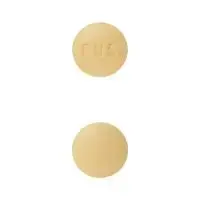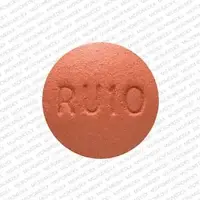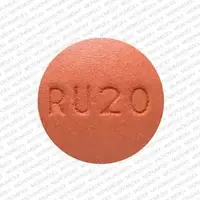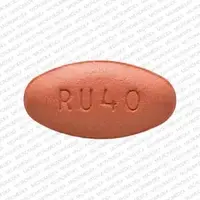Generic name: rosuvastatin
Drug class: Statins
Dosage form: oral capsule, oral tablet
Availability: Prescription only
Pregnancy & Lactation: Risk data available
Brand names: Crestor, Ezallor sprinkle
What is Rosuvastatin?
Rosuvastatin (Crestor, Ezallor Sprinkle) is a prescription medication used to treat high cholesterol and prevent heart attacks and strokes.
Rosuvastatin belongs to a class of drugs called statins. It works in two ways. Rosuvastatin works by blocking an enzyme in the liver called HMG-CoA reductase, which leads to the liver making less cholesterol. It also works by increasing the liver's uptake of cholesterol from your blood and its breakdown.
Rosuvastatin comes as a tablet and a capsule. The tablet formulation for rosuvastatin was first approved by the US Food and Drug Administration (FDA) in 2003 under the brand name Crestor. Many generic versions of rosuvastatin tablets have since been approved.
Rosuvastatin is also available as a capsule, which was approved in 2018 under the brand name Ezallor Sprinkle. Adults who can't easily swallow a tablet or capsule can open the capsules and sprinkle the granules onto soft food and eat it. A generic version of the capsules has not been approved.
What is rosuvastatin used for?
Rosuvastatin tablets are used along with diet to:
- lower the level of your “bad” cholesterol (low-density lipoprotein, LDL)
- increase the level of your “good” cholesterol (high-density lipoprotein, HDL)
- lower the level of fat in your blood (triglycerides)
- slow the buildup of fatty deposits (plaque) in the walls of blood vessels
Rosuvastatin tablets are used:
- to treat adults who cannot control their cholesterol levels by diet and exercise alone.
- to treat children 8 to 17 years of age with heterozygous familial hypercholesterolemia (an inherited condition that causes high levels of LDL). Rosuvastatin tablets are not approved for use in children with heterozygous familial hypercholesterolemia younger than 8 years of age.
- to treat children 7 to 17 years of age with homozygous familial hypercholesterolemia (an inherited condition that causes high levels of LDL). Rosuvastatin tablets are not approved for use in children with homozygous familial hypercholesterolemia younger than 7 years of age.
- to reduce the risk of heart attacks and strokes in men 50 years of age and older and women 60 years of age and older who do not have known heart disease but do have certain additional risk factors.
Only Crestor tablets are approved for use in children. Generic versions of rosuvastatin tablets and rosuvastatin capsules are not approved for use in children due to the marketer of Crestor tablets currently having exclusive marketing rights for use of rosuvastatin in this age group.
Rosuvastatin capsules are used in adults along with diet to:
- lower the level of your “bad” cholesterol (LDL).
- lower the level of fat in your blood (triglycerides).
It is not known if rosuvastatin is safe and effective in people who have Fredrickson Type I and V dyslipidemias.
Related/similar drugs
atorvastatin, simvastatin, Lipitor, ezetimibe, fenofibrate, Crestor, pravastatinHow should I take Rosuvastatin
How should I take rosuvastatin tablets:
- Take the tablets exactly as your doctor tells you to take it.
- Take the tablets by mouth, 1 time each day. Swallow the tablet whole.
- The tablets can be taken at any time of day, with or without food.
- Do not change your dose or stop this medication without talking to your doctor, even if you are feeling well.
- Your doctor may do blood tests to check your cholesterol levels before and during your treatment with rosuvastatin. Your doctor may change your dose of it if needed.
- Your doctor may start you on a cholesterol lowering diet before giving you rosuvastatin. Stay on this diet when you take this medication.
- Wait at least 2 hours after taking rosuvastatin tablets to take an antacid that contains a combination of aluminum and magnesium hydroxide.
How should I take rosuvastatin capsules:
- Take the capsules exactly as your doctor tells you to take it.
- Take the capsules by mouth, 1 time each day. Swallow the capsules whole.
- Do not crush or chew the capsules.
- The capsules can be taken at any time of day, with or without food.
- Taking rosuvastatin capsules with soft food
If you have trouble swallowing a whole capsule, you can open the capsule and take the contents with soft food (applesauce, or chocolate- or vanilla-flavored pudding). See the “Instructions for Use” that come with your medication for instructions on how to take the capsules with soft food (applesauce, or chocolate- or vanilla-flavored pudding).- Carefully open the capsules.
- Sprinkle the granules filled in the capsules on 1 teaspoonful of soft food (such as applesauce, or chocolate- or vanilla-flavored pudding.
- Swallow the granules-soft food mixture within 60 minutes. Do not chew the granules.
- Do not save the granules-soft food mixture for later use. Throw away any remaining granules-soft food mixture.
- Taking rosuvastatin capsules through a nasogastric tube
See the “Instructions for Use” that come with your medication for instructions on how to mix and give the capsules through a nasogastric tube 16 French or larger.- Remove the plunger from 60 mL catheter tipped syringe.
- Carefully open the capsules and empty the granules into catheter tipped syringe barrel.
- Add 40 mL of water to the granules that are inside of the catheter tipped syringe barrel. Do not use other liquids.
- Replace the plunger and shake the catheter tipped syringe well for 15 seconds.
- Attach the catheter tipped syringe to a nasogastric tube (≥16-French).
- Give the mixture right away through the nasogastric tube into the stomach. Do not save the mixture for later use. Throw away any remaining mixture.
- After giving the mixture, the nasogastric tube should be flushed with 20 mL of additional water.
- Do not change your dose or stop this medication without talking to your doctor
- Your doctor may do blood tests to check your cholesterol levels before and during your treatment with rosuvastatin. Your doctor may change your dose of it if needed.
- Your doctor may start you on a cholesterol lowering diet before giving you rosuvastatin. Stay on this diet when you take this medication.
- Wait at least 2 hours after taking rosuvastatin tablets to take an antacid that contains a combination of aluminum and magnesium hydroxide.
Dosing information
Rosuvastatin tablets:
- Dose range: 5-40 mg once daily. Use 40 mg dose only for patients not reaching LDL cholesterol goal with 20 mg.
- Adults with homozygous familial hypercholesterolemia: Starting dose 20 mg/day.
- Pediatric patients with homozygous familial hypercholesterolemia: 20 mg/day for patients 7 to 17 years of age.
- Pediatric patients with heterozygous familial hypercholesterolemia: 5 to 10 mg/day for patients 8 to less than 10 years of age, and 5 to 20 mg/day for patients 10 to 17 years of age.
Rosuvastatin capsules:
- Dose range: 5 mg to 40 mg once daily. Use 40 mg dose only for patients not reaching LDL cholesterol goal with 20 mg.
- Adults with homozygous familial hypercholesterolemia: Starting dose 20 mg/day.
Before Taking
Do not take rosuvastatin if you:
- are allergic to rosuvastatin calcium or any of the ingredients in your rosuvastatin tablet or capsule. See below for a complete list of ingredients.
- have liver problems.
What should I tell my doctor before taking rosuvastatin?
Before taking rosuvastatin, tell your healthcare provider about all or your medical conditions, including if you:
- have unexplained muscle aches or weakness
- have or have had kidney problems
- have or have had liver problems
- drink more than 2 glasses of alcohol daily
- have thyroid problems
Also tell your healthcare provider if you are 65 years of age or older or are of Asian descent.
What happens if I miss a dose?
If you miss a dose of rosuvastatin, take it as soon as you remember. However, do not take 2 doses within 12 hours of each other.
What happens if I overdose?
If you take too much rosuvastain or overdose, call your doctor or go to the nearest hospital emergency room right away.
What should I know about storage and disposal of this medication?
Keep this medication in the container it came in, tightly closed, and out of reach of children. Store it at room temperature and away from excess heat and moisture (not in the bathroom).
It is important to keep all medication out of sight and reach of children as many containers (such as weekly pill minders and those for eye drops, creams, patches, and inhalers) are not child-resistant and young children can open them easily. To protect young children from poisoning, always lock safety caps and immediately place the medication in a safe location – one that is up and away and out of their sight and reach. http://www.upandaway.org
Unneeded medications should be disposed of in special ways to ensure that pets, children, and other people cannot consume them. However, you should not flush this medication down the toilet. Instead, the best way to dispose of your medication is through a medicine take-back program. Talk to your pharmacist or contact your local garbage/recycling department to learn about take-back programs in your community. See the FDA's Safe Disposal of Medicines website (http://goo.gl/c4Rm4p) for more information if you do not have access to a take-back program.
What special dietary instructions should I follow?
Eat a low-fat, low-cholesterol diet. Be sure to follow all exercise and dietary recommendations made by your doctor or dietitian. You can also visit the National Cholesterol Education Program (NCEP) website for additional dietary information at http://www.nhlbi.nih.gov/health/public/heart/chol/chol_tlc.pdf.
Rosuvastatin side effects
Serious side effects of rosuvastatin include:
- Muscle pain, tenderness and weakness (myopathy). Muscle problems, including muscle breakdown, can be serious in some people and rarely cause kidney damage that can lead to death. Tell your doctor right away if:
- you have unexplained muscle pain, tenderness, or weakness, especially if you have a fever or feel more tired than usual, while you take this medication.
- you have muscle problems that do not go away even after your doctor has told you to stop taking this medication. Your doctor may do further tests to diagnose the cause of your muscle problems.
Your chances of getting muscle problems are higher if you: - are taking certain other medicines while you take rosuvastatin
- are 65 years of age or older
- have thyroid problems (hypothyroidism) that are not controlled
- have kidney problems
- are taking higher doses of this medication
- Liver problems. Your doctor should do blood tests to check your liver before you start taking this medication and if you have symptoms of liver problems while you taking it. Call your doctor right away if you have any of the following symptoms of liver problems:
- feel unusually tired or weak
- loss of appetite
- upper belly pain
- dark urine
- yellowing of your skin or the whites of your eyes
The most common side effects of rosuvastain may include:
- headache
- muscle aches and pains
- abdominal pain
- weakness
- nausea
Additional side effects that have been reported with rosuvastatin include memory loss and confusion.
Tell your doctor if you have any side effect that bothers you or that does not go away.
These are not all the possible side effects. For more information, ask your doctor or pharmacist.
Call your doctor for medical advice about side effects. You may report side effects to FDA at 1-800-FDA-1088.
See more: Rosuvastatin Side EffectsWhat other drugs will affect Rosuvastatin?
Tell your doctor about all the medicines you take, including prescription and over-the-counter medicines, vitamins, and herbal supplements. Talk to your doctor before you start taking any new medicines.
Taking rosuvastatin with certain other medicines may affect each other causing side effects.
Especially tell your doctor if you take:
- cyclosporine (a medicine for your immune system)
- gemfibrozil (a fibric acid medicine for lowering cholesterol)
- darolutamide (a medicine for the treatment of prostate cancer)
- regorafenib (a medicine used to treat cancer of the colon and rectum)
- anti‑viral medicines including certain HIV or hepatitis C virus drugs such as:
- lopinavir, ritonavir, fosamprenavir, tipranavir, atazanavir, simeprevir
- combination of:
- sofosbuvir/velpatasvir/voxilaprevir
- dasabuvir/ombitasvir/paritaprevir/ritonavir
- elbasvir/grazoprevir
- sofosbuvir/velpatasvir
- glecaprevir/pibrentasvir and
- all other combinations with ledipasvir including ledipasvir/sofosbuvir
- certain anti-fungal medicines (such as itraconazole, ketoconazole and fluconazole)
- coumarin anticoagulants (medicines that prevent blood clots, such as warfarin)
- niacin or nicotinic acid
- fibric acid derivatives (such as fenofibrate)
- colchicine (a medicine used to treat gout)
Ask your doctor or pharmacist for a list of these medicines if you are not sure.
Know all of the medicines you take. Keep a list of them to show your doctor and pharmacist when you get new medicine.
What other information should I know?
Keep all appointments with your doctor and the laboratory. Your doctor may order lab tests during your treatment, especially if you develop symptoms of liver damage.
Before having any laboratory test, tell your doctor and the laboratory personnel that you are taking rosuvastatin.
Do not let anyone else take your medication. Ask your pharmacist any questions you have about refilling your prescription.
It is important for you to keep a written list of all of the prescription and nonprescription (over-the-counter) medicines you are taking, as well as any products such as vitamins, minerals, or other dietary supplements. You should bring this list with you each time you visit a doctor or if you are admitted to a hospital. It is also important information to carry with you in case of emergencies.







